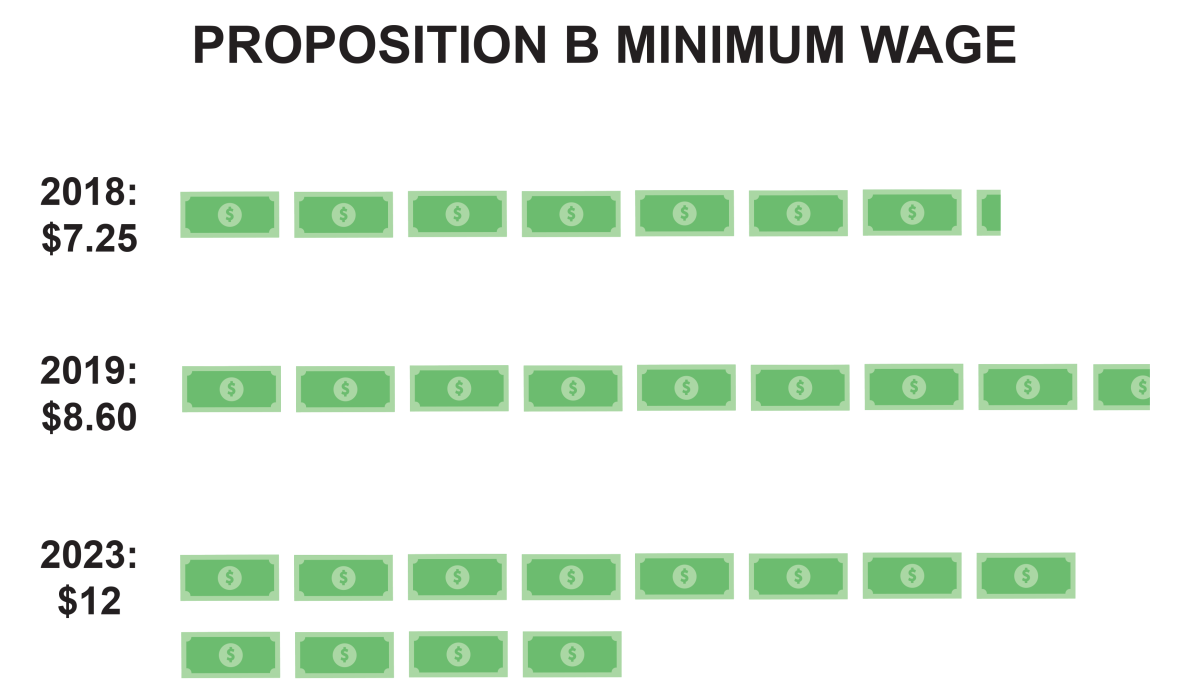_Bryce Kolk is a freshman journalism major at MU. He is an opinion columnist who writes about politics for The Maneater._
Proposition B will appear on the Missouri midterm ballot on November 6th, 2018 and, if passed, would ensure a $12/hour minimum wage for Missouri workers by 2023. The minimum wage would increase annually, first to $8.60 in 2019, and would increase or decrease after 2023 based on changes in the Consumer Price Index.
This is not enough. In one of the wealthiest societies in the world, a $12 minimum wage is still too low. But still, it’s something.
The federal minimum wage is at a near historic low, $7.25/hour, when looking at the modern era of American history, adjusting for inflation. The $1.90/hour that a non-farm minimum wage worker netted in 1974 has the same buying power as $10.11/hour today, according to the US Bureau of Labor Statistics’ inflation calculator. What is more egregious, however, is contextualizing that number with GDP/capita growth. If adjusted for both inflation and growth in GDP/capita, 1974’s minimum wage would come out to a whopping $21.56/hour in 2018 money, according to the US Census Bureau and the US Bureau of Economic Analysis. Essentially, if low-wage American workers truly saw the fruits of their efficiency, they’d be paid almost three times what they’re paid today.
Suddenly, a $15/hour wage doesn’t seem so socialist.
On the human side, according to MIT’s living wage calculator, a Missouri family of two working adults and two children hoping to sustain on a living wage needed $15.09/hour, assuming both parents work. If only one parent earns a wage, while another stays home with the children, the living wage threshold climbs to $25.39/hour. At times in recent history, these scenarios were both attainable for America’s working class, but not in 2018.
Despite these statistics, one must remain realistic. Missouri is not going to be paving the way for wage progress in America. Families are struggling to put food on the table and clothe their children, but Missouri remains steadfastly conservative on wages. Going any further than $12/hour will likely lose support from moderate Missourians. With major companies increasing their starting wage to around $12/hour, it seems to be the most logical choice for Missouri’s state minimum wage.
Proposition B is the best solution Missouri has.
Pushing for a $15 minimum wage in Missouri is a monumental task. While nobel, it’s a largely futile effort, and one must be willing to compromise. From a place of privilege, however, it is easy to be uncompromising. It can be argued that when one is earning that living wage, it becomes more difficult to see society from the perspective of those at the minimum wage. But any relief from poverty and starvation-labor must be welcomed. Getting all Missourians at a higher, even if too low, wage is imperative to improving quality of life. Proposition B will make living in Missouri easier for low-wage workers.
Getting Missouri to the goalpost of a $15/hour minimum wage or higher is not going to come from its state legislature or its voters. It will come from a fiscally liberal federal government, whenever that becomes a reality. The idea of an impending “blue wave” is well supported by polling, with Democrats being the clear favorite to win the House in November. Winning the Senate in 2018 is looking unlikely, however, and the Presidency isn’t on the ballot until 2020. Still, it is entirely possible that a federal minimum wage increase of more than $12/hour could be enacted before 2023, forcing Missouri onto the federal minimum wage. Sustaining Missourians right now is more important than risking their livelihoods on the unlikeliness of a more progressive agenda in a red state. A living wage will come out of Washington D.C., not out of Jefferson City.
MU’s campus minimum wage would be impacted, as well. Campus Dining Services advertises a starting wage of $8.64/hour as competitive. If proposition B passes, Campus Dining Services’ current starting wage would be 81 cents below minimum wage in just over a year.
While the realities of student life differ greatly from those of a minimum wage earner trying to make rent and feed a family, both would benefit from an expanded minimum wage. With a higher wage, students can spend more money on the things they enjoy, priming the pumps of local economies. MU students at a higher wage would invest more in their community. Columbia’s downtown would be served well by the influx of capital a $12 minimum wage would bring.
A minimum wage increase is desperately needed for Missouri’s working poor. While not ideal, Proposition B should be welcomed with open arms.













